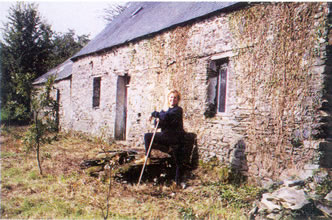Buying a Home in France
It Only Takes a Little Money and Nerve
By Lorren L. Repton

My rose cottage dream appeared like
a Moneypit nightmare, but only at first.
Over a decade ago my British-born husband and I began our quest for a stone cottage in Brittany, the land of legends and myths, menhirs
and dolmens. The countryside is reminiscent of Devon and Cornwall — where I had lived
for several years — but more mysterious.
The good news is that any foreigner can buy a home in France, even rent it out once bought, and there are plenty of resources on property buying available online to guide you along the path.
Our pursuit began with the FrenchEntrée,
where we could look at color photos and post our tailored request for that idyllic stone house: the building should have four intact walls; the roof should
be in good repair and the supporting beams sturdy. And it had to have enough ground for a garden.
We discovered that in our price bracket at the time we would be looking at properties with dirt floors
and no indoor plumbing. The least expensive properties were being snapped up quickly by British buyers. We started to feel that if we didn't jump on a jet
for France we would be too late.
Then came an email from an elderly British gentleman, Don Payne,
a French property consultant, who acts as an intermediary between the French immoblier (real estate agent) and notaire, France's version of a real estate
attorney. He was based in Brittany and had located a farmhouse that would be perfect
for us based on our wish list. His email described a property located in the Côtes d'Armor area of Brittany in the commune of Saint Mayeux; the attached photos pictured the maison of our dreams. Anxious and cautious, we made a bid at half the asking
price, a little on the high side for our budget. The French owners, Monsieur and Madame Blanchard, took the lowball offer and the paperwork was set in motion.
To begin the process we signed a compromis de vente or sales agreement and mailed off a check for 10 percent of the agreed selling price
from our French bank account at Societe Generale, introduced to us by our consultant while
we were in the U.S.
Exactly three months later we wired enough funds from our U.S. bank account into our French bank account to pay for the house and notaire's
fees, which can vary from 3 percent to a little over 7 percent depending on whether the home is brand new or over five years old. Then of course our French
property consultant's fees had to be paid. Since we didn't use an immoblier, we were saved additional commission fees.
Instead of having the consultant or the notaire sign the papers for us by proxy, which is not uncommon, we boarded a plane home. At Orly airport, we picked up our rent-a-car and drove five hours through
the night to reach the commune of St. Mayeux in the wee hours of early morn.
I had to ask a storekeeper if she had heard of our village, Longaës, which turned out to have only two houses; imagine that, we
would own half a village. The storekeeper disappeared into the rear of the shop and returned with a topographical map used by bicyclists. We found our village
on the map and hastily made our way down the lane and through the fields to view the 18th century house that Jacque built.
It certainly was a fixer-upper: dirt floors, rotten upstairs floor beams, overgrown gardens, obstructed drainage ditches, missing roof
tiles, rotten window frames, 10-foot tall spiky brambles growing in through the roof, birds nesting in the rafters, and rat droppings everywhere inside the
musky, moldy, and fungus-covered dwelling. My rose cottage dream looked like a Money Pit nightmare.
We lept to our rental car and sped to a phone box to call our consultant and cancel the deal. Alert to our intention, he invited us to
see his gîte, which is a rural self-catering holiday cottage.
Though his house was far from perfect, history oozed from every crack and imperfection. Our qualms soon turned to calm as we imagined
our farmhouse in a more finished state of repair. We would indeed travel to the notaire's office the following day for a formal reading of the title conveyance clause en tontine, which allows the property to pass from husband to wife and vice versa without having to be distributed to children or other heirs under
French law. It is also a good idea to have a French will written by a bilingual solicitor or attorney when purchasing property in France.
|
For More Info
Complete France: French Property is a helpful website with a forum where mostly Brits share questions and answers about living, working, and vacationing in France. It
gets down to the nitty gritty about taxation, healthcare, residency, restoring an old farmhouse, schooling for children, and just about anything you
can think of asking.
The section on Living in France on the TransitionsAbroad.com website has plenty of resources and links for prospective home buyers for Americans and other nationalities to explore and answer questions about the process.
|
Lorren L. Repton is the editor of Big Bear Magazine in Southern California's Big Bear Valley.
|
